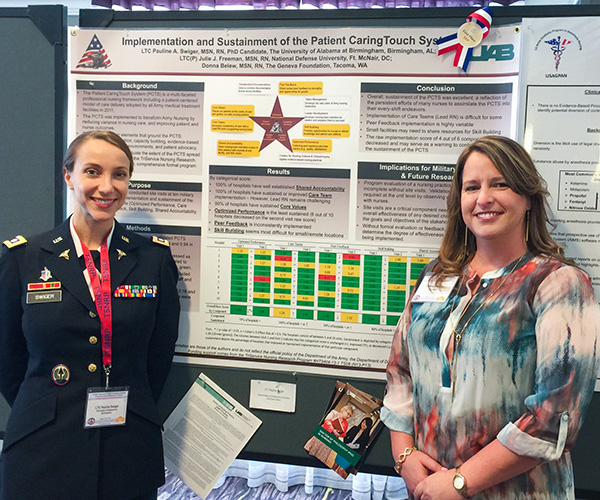
University of Alabama at Birmingham (UAB) School of Nursing Doctor of Philosophy in Nursing (PhD) student Pauline Swiger, MSN, RN, CNL, CMSRN, and Doctor of Nursing Practice (DNP) student Julie Freeman, MSN, RN, ACNS-BC, CWON, were among a trio of collaborators receiving first-place recognition for an abstract they recently presented at the TriService Nursing Research/Evidence-Based Practice Dissemination Course in San Antonio, Texas.
Swiger, a lieutenant colonel in the United States Army Nurse Corps posted at Fort Sam Houston, Texas, and fellow lieutenant colonel Freeman, posted at the Eisenhower School, National Defense University, Fort Lesley J. McNair, Washington, D.C., co-authored the abstract "Implementation and Sustainment of the Patient CaringTouch System," with Donna Belew, MSN, RN, a project director at The Geneva Foundation where she manages several research grants and is assigned to the Center for Nursing Science & Clinical Inquiry at Madigan Army Medical Center in Tacoma, Washington.
The Patient CaringTouch System (PCTS) is a care delivery framework implemented throughout U.S. Army medical treatment facilities in 2011. It was built to improve patient outcomes and decrease practice variation through team communication, healthy work environments, evidence-based practices, patient advocacy and building leader capability.
Swiger, Freeman and Belew were part of a program evaluation team that conducted site visits at 10 military hospitals to assess the efficacy of the PCTS framework. The team studied implementation and sustainment of the PCTS core components Optimized Performance, Care Teams, Peer Feedback, Skill Building, Shared Accountability and Core Values.
The program evaluation team found that:
- Overall sustainment of the PCTS was excellent and a reflection of the persistent efforts of many nurses to assimilate the PCTS into their every-shift endeavors.
- 100 percent of the hospitals visited had well-established Shared Accountability programs.
- 90 percent of hospitals had sustained a Core Values Program.
- Implementation of Care Teams had sustained or improved at most hospitals, though the lead RN role remained challenging for many.
- Peer Feedback was inconsistently implemented.
- Small and remote facilities may need to share resources for Skill Building.
- Optimized Performance was the least sustained and may serve as a warning that continued focus on the PCTS components is required for sustainment.
Swiger said that identifying the successes and challenges of implementing the PCTS care delivery framework are important because it may lead to the creation of additional sustainment resources for frontline staff. In addition, these results will be used to evaluate the framework's association with nurse and patient outcomes.
The trio's program evaluation team also included Col. Sara T. Breckenridge-Sproat, the principal investigator on the PCTS project, and UAB School of Nursing faculty Donna Brown Banton Endowed Professor Pat Patrician, PhD, RN, FAAN, Associate Professor Lori Loan, PhD, RN, FAAN, and Assistant Professor Dheeraj Raju, PhD.